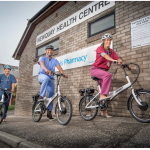Like NHS workers across the UK, the doctors at Newquay Health Centre have had a challenging year on the front lines of the pandemic. The centre’s one of the largest in Cornwall and as well as supporting thousands of local patients at the surgery itself, there are many elderly or frail patients that rely on the doctors for regular home visits.
A helping hand
To go some small way to help the doctors during this difficult time, Halfords donated three Assist hybrid electric bikes to the surgery last summer. The e-bikes had an immediate positive impact on their home visits.
“We used to drive to patients’ homes in our cars, which could mean an hour-round trip to see one patient due to traffic,” Dr Rutesh Patel, one of the practice’s doctors explains. “Doing the journey on an electric bike takes half the time, or less, and doesn’t leave us sweaty and tired for our afternoon clinics.”
The cycling revolution
E-bikes have seen a rapid rise in popularity over the last few years, with commuters and enthusiasts alike embracing their unique blend of bike and motor.
It’s easy to see why – not only can you get in a good workout on an electric bike, but you can tackle tricky hills with ease, cycle further and arrive at your destination without the feeling that you’ve just run a marathon.
“It’s also fun to get on a bike that’s powered,” Dr Patel highlights. “Fun and functional.”
And it’s not just e-bikes. One unexpected side effect of the pandemic has been a full-on cycling revolution, with thousands taking to the roads on two wheels for safe, socially-distanced exercise. It’s become the perfect antidote to the inactivity brought about by lockdown restrictions and the perfect way to enjoy some time outside the four walls of our own homes.
Effective and inclusive exercise
Even without the confines of coronavirus, cycling is a pretty great way of staying fit, healthy and happy. It’s one of the best forms of cardio exercise around, providing a low-impact workout that’ll get your heart pumping, strengthen your leg muscles and improve your joint mobility. Cycling will also boost your stamina and help you burn off those extra calories more effectively than a walk or run would (which means you can treat yourself a little more often!).
It’s a really accessible form of exercise too, allowing everyone from toddlers to grandparents to reap the benefits and work at their own pace. And the low-impact nature of cycling means that it doesn’t put any pressure on weight-bearing joints, so it’s ideal for those with hip, knee or feet problems.
A healthy body and a healthy mind
Mental health is just as important as physical health – particularly during a situation like lockdown – and cycling can help here too. On a very basic and general level, exercise releases endorphins and endorphins can make you feel happier and more content. So, the more cycling you do, the better you’ll feel.
On a more specific level, cycling can help to combat the loneliness, isolation and anxiety that many of us are feeling during lockdown. It’ll get you out in the fresh air, give you some much-needed human interaction (at a safe distance) and give you a chance to clear your head. Sometimes all we need is a little time to think through a problem or to put things into perspective, and challenges that once seemed insurmountable suddenly come into focus.
Thanks to their new e-bikes, Dr Patel and his colleagues have first-hand experience of the ways in which cycling can support better mental wellbeing. “The e-bikes have enabled us to enjoy getting to patient’s houses and get some much-needed fresh air over lunchtime,” he shares. “This has positively impacted our mental wellbeing as we all know that getting out and getting fresh air is good for you.”
A greener way to travel
As well as being good for you, cycling is also pretty good for the environment. By taking to two wheels you’ll be helping to reduce CO2 emissions, noise pollution and congestion, all of which contributes to cleaner and greener towns and cities.
Cycling has certainly helped the Newquay Health Centre to set more of an eco-friendly and healthy-living example to the local population over the last six months. “It’s boosted the green ethos of the practice,” Dr Patel says. “Not having to use our fossil fuelled cars to do short trips has made us all feel better. Between all of us, the overall positive environmental impact has been great.”
Putting patients first
Physical, mental and environmental benefits of cycling aside, for Dr Patel there’s one other clear winner in this scenario: the patients.
“I came into medicine to help patients, not to sit in traffic jams listening to the radio!” he exclaims. And cycling allows him to do just that.
For more information on how cycling can help both your physical and mental wellbeing, check out our recent guest blog from Olympic gold medallist Victoria Pendleton and our online hub.


